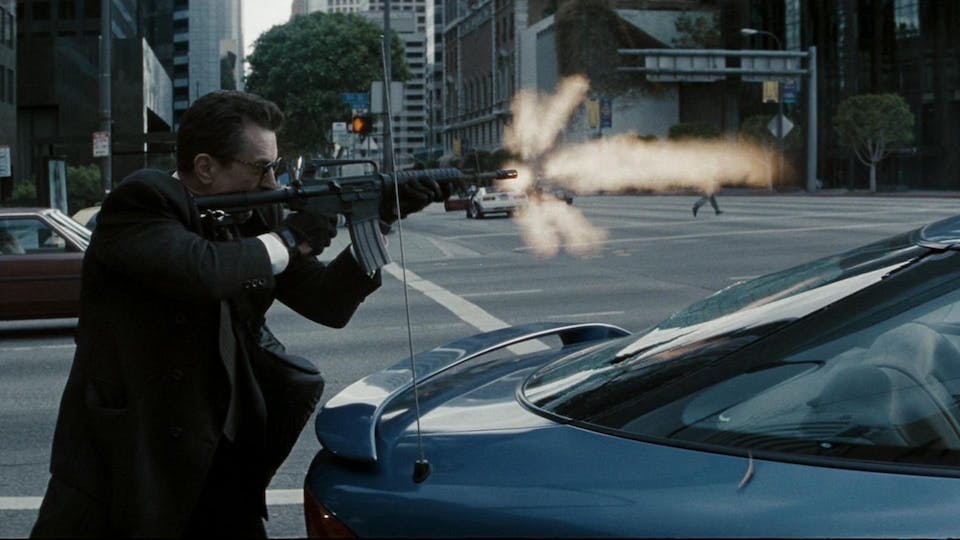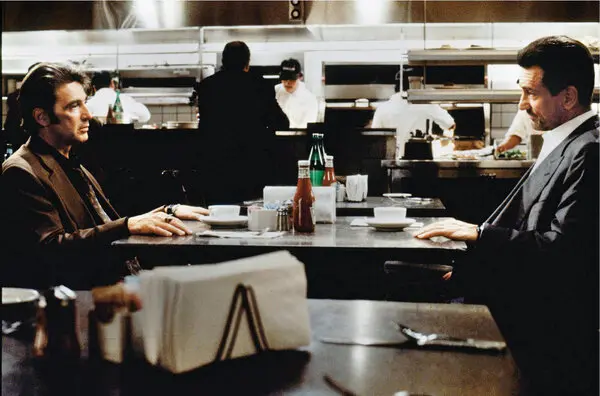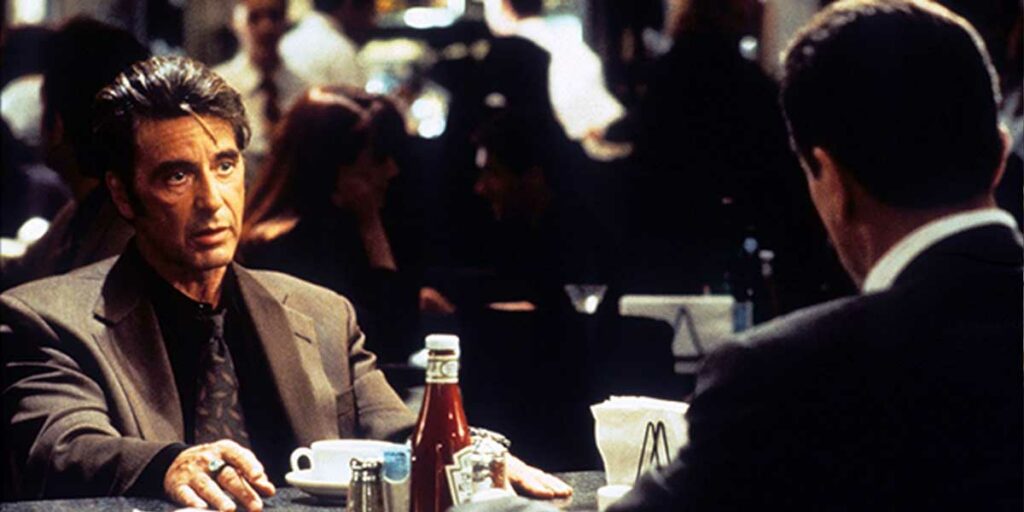Michael Mann’s Heat masterfully uses Al Pacino and Robert De Niro to meditate on crime and masculine codes, creating a superbly executed thriller.
Action movies are tough to pull off. They must be thrilling and inventive in a genre where thrilling and inventive things are the bare minimum. It’s hard to find something new when there are so many tropes and stereotypes that are constantly being repackaged and sold as if they aren’t just ripping off the things that came before them. But sometimes, these tropes can be used by great filmmakers and actors to create profound examinations of not just violence, crime, and masculinity, but of the nature of humanity itself. The samurai movies of Akira Kurosawa, the gangster movies of Scorsese and De Palma, and the crime thrillers of Michael Mann all are part of this storied tradition. And in Mann’s ultimate triumph, Heat, he harnesses the power of Al Pacino, Robert De Niro, and a stellar supporting cast along with his trademark moody style and realistic violence, to craft one of the best action films ever made.
Heat is a classical cops and robbers story: Pacino plays Vincent Hanna, a lieutenant in the Major Crimes division of the Los Angeles Police Department. De Niro plays Neil McCauley, a professional thief and the leader of an exceptionally efficient and effective crew. The film follows these two groups as they circle each other as we prepare for their inevitable showdown. What separates this movie from other films is the exploration of the characters. The film parallels the experiences of the criminals and the police, making you unsure of who to root for. Inside this tense thriller, we get a compelling examination of these character’s motivations, values, and, most importantly, codes. Heat is about how people live their lives and the cost of the decisions we make, which combines a standard action movie with an existentialist drama to perfect effect.
One of the most impressive things about Michael Mann’s style of filmmaking is how entertaining his films can be. He specializes in writing about moody, existential criminals, but he never forgets to give you a good dose of clean and slick action sequences to complement the character studies. The deeper he brings you into the character and the more intense the set pieces, the better the movie is. In Heat, he gives you both. He is great at writing a stylized form of dialogue that at times can feel like poetry. In one of the best scenes of the movie, an excellent Diane Venora eviscerates Al Pacino with, “You don’t live with me, you live amongst the remains of dead people.” This kind of elevated speech can come across as pretentious or unrealistic in lesser movies, but his casting and writing are so excellent that it works.

It goes without saying that Mann’s cinematic chops are incredibly refined. He frames actors with intense backdrops that perfectly evoke mood. His editing is patient at times and relentless at others, but it always feels controlled. His set design always aims to highlight the character’s perspective along with showing a side of LA that feels authentic and gritty in a city that is usually so glamorized. But the real genius of the movie is the action set pieces. The film has two of the most compelling and exhilarating action sequences I have ever seen. The filmmaking is exceptional. The editing (Dov Hoenig, Pasquale Buba, William Goldenberg, and Tom Rolf) is so precise and clean, making for a legible watching experience. The sound is absolutely relentless, coming from Mann’s commitment to capturing gun sounds on the set of Heat instead of adding effects in post-production. The authenticity of the violence feels military grade, and the suspense he delivers is a testament to his commitment to making incredibly realistic and immersive action in cinema.
Despite the excellent filmmaking, Heat truly relies on its excellent ensemble cast to make it sing. The actors that he cast are exceptional, with the likes of Danny Trejo, Hank Azaria, William Fitchner, Mykelti Williamson, Dennis Haysbert, Tom Sizemore, and others playing minor roles to great effect. Additionally, Val Kilmer delivers a stellar supporting performance opposite an excellent Ashley Judd. Their toxic relationship is evoked quickly and effectively, and Kilmer is equal parts explosive and tender.
The women characters in the film are surprisingly nuanced for a Michael Mann film. In Judd’s Charlene, he crafts a wife and mother unsatisfied and Judd plays her with a strength that adds texture to a character who could easily come across as weak and annoying. He uses the familiar trope of the wife holding back the exceptional husband in Diane Venora’s Justine, but her willingness to cut Vincent down to size, her excellent control, along with her fantastic line readings allow her to go toe-to-toe with Pacino, an impressive feat for any actor. And Amy Brennemen’s Edey is phenomenal. Her loneliness and warmth perfectly contrast Neil’s icy and suspicious nature. She is so likable and humble that you root for her and, by association, Neil as well, which further complicates our relationship with those in Heat we support.
But ultimately, this film is about Al Pacino and Robert De Niro, and their performances are excellent. Pacino is in rare form, with absurd line readings, violent outbursts, and a swagger that is unreplicable. Michael Mann’s dialogue is perfect for him, and he adds a lyricism to speeches and one-liners that is almost Shakespearean. Pacino is certainly over-acting in Heat, but it feels intentional. It works perfectly to contrast the calm that he can display on command. But what is really exceptional about this character is the warmth that he has. Pacino is such a dynamic performer, but what can get lost is how much goodness and heart he can put into his characters, and Vincent is a perfect example of this. His tenderness allows us to root for him and see him as more than just a complex perfectionist, but as someone who is really trying to do good and help people.
Contrasting Pacino’s dynamism is De Niro’s measured and cold performance as Neil. De Niro has always been an actor who can show you that he is thinking without showing you what he’s thinking about. This cerebral nature is harnessed in Heat to create the perfect criminal. Neil is efficient, calculating, and, most importantly, disciplined. His code for life states, “Don’t let yourself get attached to anything you are not willing to walk out on in 30 seconds flat if you feel the heat around the corner.” This line defines every action in his life. His relationship with Edey is the only time he allows himself to be human, and, even then, he is withholding, knowing that he cannot be fully committed to her and the life of crime he leads. This control is perfectly contrasted with Pacino’s bold performance, and De Niro effortlessly pulls it off.

The climax of Heat is the scene in which Al Pacino and Robert De Niro meet and sit at a diner for coffee. In one of the most famous scenes of the ’90s, the men discuss their professions, how they interfere with their personal lives, and the codes by which they live. The scene is filmed in a shot-reverse-shot, meaning the whole thing alternates between Pacino and De Niro’s face. The two actors match each other perfectly. There is an understanding between Vincent and Neil that can only be shared between two completely driven people. But also, the scene stands in for a metatextual conversation between these two actors, friends for years and never in a film together. This scene is also a meeting of equals, both in terms of two great actors and two great characters.
Michael Mann is interested in what it means to live by codes, and Pacino and De Niro are masters at creating characters who can embody those codes. The intersection of these men is the driving force behind this movie, and this scene is the ultimate culmination of the themes and cinematic ideals of Heat.
Heat is now available to watch on digital and on demand.

